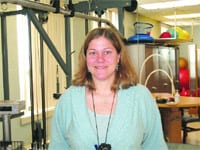One Step at a Time Weldon Rehabilitation Hospital Helps Patients Get Back to Living
When Jill LeGates surveys the acute inpatient unit at Weldon Rehabilitation Hospital, she understands the importance of having the full resources of Mercy Medical Center on the same campus.
The 30-bed inpatient acute rehab unit is for “patients who suffer a pretty devastating illness or injury that requires hospital care,” said LeGates, director of Rehabilitation Services at Weldon, a facility that has grown since in 1974 inception to employ more therapists and certified rehabilitation nurses than any other rehab facility in Western Mass.
The acute-care unit, she explained, is a short-term rehabilitation center with a hospital level of care, for people who need rehab but still have some acute medical needs requiring such an intense setting. It’s the only acute rehabilitation unit in the region accredited by the Commission on Accreditation of Rehabilitation Facilities.
“The big difference for us is, we’re attached to an acute-care hospital, and we have the resources of the hospital right here,” she told The Healthcare News. “In a lot of free-standing rehab centers, if a patient needs an X-ray or a barium swallow, they have to send them off-site for that service. Mercy hospitalists cover here, so if they come to Mercy, the same physicians are seeing them here as in the hospital. All the hospital-based services at Mercy are resources for us here.”
Come One, Come All
Patients come to Weldon to treat and recover from a wide variety of conditions, from arthritis to burns; foot injuries to joint replacement; spinal cord injury to stroke. Outpatient services run a broad gamut as well, and include:
A cardiac rehabilitation program to help people recovering from a heart attack or heart surgery. Therapists examine patients’ medical history and heart-health goals and work out an individualized plan for nutrition and exercise, starting light and gradually increasing in intensity.
A comprehensive pain-management program, which can include a mix of medication, physical and occupational therapy, and pain psychology, among other things, to help patients regain quality of life. Conditions treated range from arthritis and joint pain to back pain, facial pain, headaches, pain from cancer, and many other conditions.
A day rehabilitation program, serving clients with acquired brain injury, neurological disorders, and complex medical conditions. Day rehabilitation focuses on restoring or increasing an individual’s independence in the home, community, and workplace.
A lymphedema program, where therapists help patients control and reduce swelling, prevent the progression of lymphedema, prevent infection, and improve overall quality of life.
A swallowing program, where specialists diagnose swallowing problems and prescribe treatments, including modified diets.
A program unique to Western Mass. that evaluates and treats patients with balance disorders and dizziness.
A wound care center that treats patients with wounds that have not started to heal in two weeks or are not completely healed in six weeks.
A driving advisement program that helps determine someone’s fitness for driving a vehicle. The program begins with a clinical evaluation completed by an occupational therapist. An on-road evaluation and training with a licensed driving instructor may also be recommended. After evaluation, results and appropriate recommendations are discussed with both the patient and their doctor.
Rehabilitation support groups for amputees, patients with aphasia, brain-injury sufferers, stroke victims, and people with spinal-cord injury.
Weldon also offers a range of outpatient pediatric therapy programs for children of all ages, including physical, occupational, and speech therapy.
“We deal with just about anything, whether it’s physical disability, developmental delay, autism, Asperger’s, or kids requiring multiple services,” LeGates said. “We see a lot of kids starting out in school, and the school can’t provide some services, and parents are looking to maximize the therapy services their kids can receive.”
Referrals to Weldon come from the hospital itself, obviously, for inpatients looking to transition into rehab, but also from physicians, social agencies, schools, and families looking for services.
Reaching Out
While Weldon has long been notable for its on-campus access to a hospital, but the Sisters of Providence Health System wanted a presence for its rehabilitation arm in the community as well, which is why Weldon has satellite offices at Healthtrax Fitness & Wellness locations in West Springfield and East Longmeadow.
“We analyzed our demographics and the types of patients who come into the city for services,” LeGates said. “Our competition was out in these suburban areas, and I think Healthtrax was looking to partner with a hospital for overall wellness and therapy. So it was a great way to branch out into those areas and attract patients who otherwise might have to come to the hospital for service. If you don’t live in Springfield but need physical therapy, you might not want to drive here.
“It keeps people in the Mercy system,” she added. “It’s nice that, if someone had knee surgery at Mercy and lives in East Longmeadow, they can stay within this health system.”
After all, when it comes to rehabilitation, there’s something to be said for not making patients’ lives more difficult.
“We want people to regain as much independence and functionality as possible and return to the community setting,” LeGates said.
No matter where their community might be.


Comments are closed.